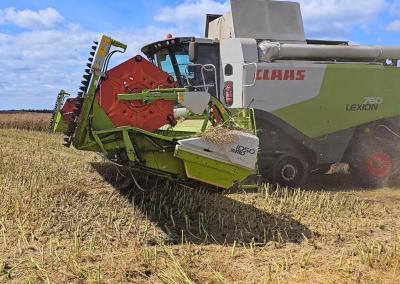Head of the VMVT A. Mikalauskiene: "In June we will start killing you"
The controversial organisation VšĮ „Tušti narvai“ seems to have crossed the boundary of decent communication and, according to the head of the State Food and Veterinary Service (VVT) Audronė Mikalauskienė, has started to do the same to the VVT „openly pressurise the VMV on the verge of blackmail“ to take decisions that would exclusively satisfy this „animal guardians“ organisation, which has recently targeted pig farmers.
The head of the HSE, A. Mikalauskiene, issued a comment on Saturday on the situation, calling it „In June we will start killing you“.
We present an unedited version of A. Mikalauskiene's message, which she circulated:
Indeed, there was no such sentence ("We will start killing you in June"), but I read the letter addressed to me personally in exactly the same way as I have titled this comment. The letter was polite and seemingly well-meaning, but I couldn't help feeling that I was reading a sentence against me.
„I would like to inform you that in June we will be launching a public campaign to get you to repeal the exemption that allows piglets to be castrated without painkillers in Lithuania“ and „As we need your signature to change the Animal Welfare Requirements for certain veterinary procedures, the focus of the campaign will be on you“. Me. Clearly.
The letter was written by Gabrielė Vaitkevičiūtė, head of the active and effective non-governmental animal protection organisation „Tušti cárvai“.
Since the letter was addressed to me personally, I hesitated for a while what to do with it. My doubts were dispelled when, on 29 May, all the staff of the office received similar letters, also informing them about the upcoming campaigns and noting that, as only one signature was needed from the Director, the focus of the campaign would be on her.The letter urges staff to be an "internal voice", to "encourage the Director of the VVM not to hesitate and to protect the piglets as soon as possible", or to provide information anonymously (also available via the "Signal" app).
This open pressure on the verge of blackmail has opened the gates. Well, let's have a frank discussion.
The main message of the whole campaign is based on a false claim. „All it takes – is one of her signatures“, reads the organisation's website. Untrue. Yes, the head of the VVM should sign the new procedure document, but neither I nor anyone else in my position can do it alone. The VMVT does not take decisions unilaterally that will affect consumer habits and a significant sector of the national economy. Especially not by the head of the service personally. Not to avoid responsibility – it's just the way market regulation mechanisms work.
The EU allows the castration of piglets up to the age of 7 days without the use of painkillers. This is done for two reasons: the meat of castrated piglets does not smell of "boar" and the piglets are much less aggressive as they grow. The first is to appeal to the taste of the consumer, the second is to protect other animals (especially on large farms).
Because castration of piglets at this age can be carried out without painkillers, it is understandable that a newborn piglet is going through a moment of terror and pain at that time.
The European Commission is calling for alternatives to castration, such as not castrating the animals but treating their meat in a different way than at present, breeding different species, and inoculating them with vaccines to reduce the specific smell of the meat. Local anaesthesia or immunocastration is also possible. It is still possible today.
In other words, this is not an "either-or" type of problem where one party wins and the other loses. There are trade-offs to be made here, and there are many. One problem – all the parties involved have to sit down and try to negotiate. Not ultimatums, but negotiation and finding ways to enforce the higher animal welfare standards - in a realistic way. Amendments to the Rules can be signed off, but they need to be enforced. We aim to lead the way to real change.
The FVO has spoken on several occasions both to empty cages and to pig farmers. We know the positions of the parties and see the prospects for a common solution. Already now, some steps are being taken to change the situation, and the VMVT is actively involved in this. For example, a pilot project is currently being discussed – a number of farms are going to raise pigs without castration.
But for a concrete solution or a number of options to emerge, there needs to be a discussion between all stakeholders, which we have been and are ready to do. And if the parties can reach an agreement, I will be happy to put my signature to a document that will replace the outdated regime.











































































































